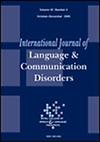Effects of training in voice auditory-perceptual skills
Abstract
Purpose
This study was designed based on the need to verify the effectiveness of education in the vocology area concerning refining perceptual auditory skills. The purpose of the project described in this paper was to examine the effect of knowledge and skills training during a 2-week voice disorders graduate course on auditory-perceptual skills of pre-professional speech-language pathologists. The training effect was evaluated by comparing pre- and post-course results of ratings of voice quality using auditory-perceptual measures.
Method
A cohort of 24 graduate students in speech-language pathology participated in this study. Each student rated a total of 24 voice samples of typical and disordered voice quality from a database using Consensus Auditory-Perceptual Evaluation of Voice (CAPE-V). The same voice samples were rated before and after the training, in randomised order. The speakers ranged in age from 35 to 80 years; 16 identified as females and 8 as males. A total of 16 samples were associated with various degrees of dysphonia of organic and functional aetiologies; the remaining 8 voice samples included in the study were classified as normal. The training involved different components including knowledge and auditory-perceptual skills as part of a voice class offered as an intensive 2-week course with daily blocks of 4 h sessions. Exploratory comparisons of results to objective outcomes were conducted through comparisons with computer-generated indicators of the Cepstral Spectral Index of Dysphonia (CSID), a component of the Analysis of Dysphonia in Speech and Voice (ADSV) software from Pentax for capturing the CSID.
Results
There was a significant increase in ratings of roughness, breathiness, loudness, pitch and overall severity after the course. Furthermore, there was a significant increase in the intra- and interrater reliability post training. Statistically significant positive indications were found in correlations between mean perceptual ratings and the acoustic measure of CSID. Reliability of data was measured by using Pearson's correlations. Intrarater reliability resulted in values of ≥0.90 in all parameters. Similar findings were demonstrated by intraclass coefficients used to estimate interrater consistency: all values were >0.90 but in the Loudness parameter [r (22) = 0.60].
Conclusion
Effectiveness of the training in improving the auditory perceptual skills of students was based on the increased reliability of ratings. Indications of successful implementation and outcomes on auditory-perpetual training procedures in classroom environments will support the development of effective educational methods, which will in turn lead to increased efficacy of service delivery in voice disorders.
WHAT THIS PAPER ADDS
What is already known on this subject
- The effects of training on perceptual assessment performance have been indicated in the literature. Past evidence has demonstrated that various types of training produce a significant impact on auditory perceptual skills. Although dedicated research has been advancing over the past decade, further aspects of auditory-perceptual reliable assessment include queries about specific training approaches, optimal duration, and interval time for recalibration.
What this paper adds to existing knowledge
- While past research suggests that increased exposure in identifying voice characteristics impacts assessment skills, there are limited published data on the relationship of knowledge and skill in association with teaching and learning environments, particularly at the pre-professional stage. Practical data from actual classroom application constitute an ideal scenario for inspecting effectiveness of graduate training in voice disorders involving acquiring knowledge and applied skills, including auditory-perceptual voice evaluation. This study is an attempt to expand on previous literature, particularly by examining effects of auditory-perceptual skills training in graduate students following teaching and learning in a systematic 2-week voice disorders course.
What are the clinical implications of this work?
- Outcomes indicative of successful training procedures in a classroom environment will support the development of effective educational methods to increase efficacy of service delivery in voice disorders.

 求助内容:
求助内容: 应助结果提醒方式:
应助结果提醒方式:


